The College of Design has a long legacy and achievement in ecological and community-based design thanks to the development and teaching of innovative design methods throughout its more than 100-year history.
The faculty and student body aspire to create a more just and livable future for all, mirroring the University of Oregon Environmental Initiative’s vision to leverage the intellectual energy and endeavors of faculty, students, and community partners towards societal contribution through transdisciplinary research, teaching, and experiential learning.
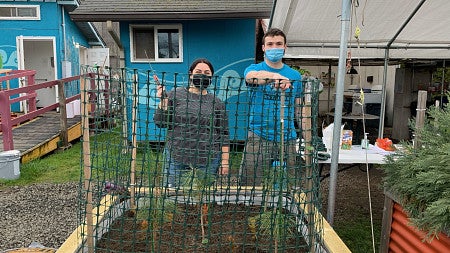
This is precisely what Landscape for Humanity (L4H), a research public service initiative in the Department of Landscape Architecture, is doing.
Co-founded by associate professor of Landscape Architecture Yekang Ko and assistant professor of Landscape Architecture and Environmental Studies Kory Russel along with other faculty and formal students in 2019, L4H offers students a chance to broaden their design education with dynamic experiential learning projects while delivering on the initiative’s promise to be a positive force on the side of social and environmental justice.
“Yekang and Kory have provided a really cool way for the information that we’re learning to actually be applied,” explained Rosie Yerke, MLA '23. “Working [with the people] at Everyone Village has grounded my education and provided me a way to apply all of what I’m learning in an actual space with actual people. It has been a really powerful experience.”
To create these powerful experiences, L4H utilizes a collaborative framework to create cooperative solutions for numerous community partners ranging from Peru to Eugene, OR. By promoting community and student engagement, the L4H team utilizes feedback from the involved parties to appropriately address community needs.
“It is exhilarating to come and talk to residents to see what their needs are and then be able to co-design it,” said Sara Loquist, PhD '26. “Their excitement when they see our plans and then the actual building together is why I love being in the design field!”
L4H gives UO students a chance to strengthen their education through meaningful, complex projects while positively impacting underserved communities around the world.
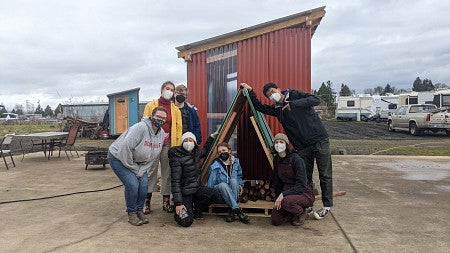
Ko’s Design for Climate Action, a 410/510 LA course, in winter 2022 saw 25 students from across the university work together on design-build and community engagement projects with local transitional housing communities in Eugene. These Landscape Architecture, Architecture, PPPM, Environmental Studies, and Clark Honors College students relish the opportunity to engage with the community to better understand their future role as change agents.
“Being able to apply [our skills] to real-world projects and talking to real people is so beneficial because I think we're craving that interaction,” explained Jessica Gonzalez, MLA '22. ”I have seen each and every one of [the participating students] grow up throughout the class, which has been so great. I think that if you have the opportunity to take a hands-on class like this, it is amazing and so beneficial for a student’s education, growth, and interpersonal skills.”
In Ko’s class, students had a chance to develop collaborative solutions to improve the conditions of the traditionally underserved populations through L4H projects with the transitional housing communities of Everyone Village and Opportunity Village.
Everyone Village is one of Eugene’s new Safe Sleep sites and a unique shelter community at the beginning of a three-phased development. After hosting community meetings, the unique challenge brought forth to the students was to develop a community meeting space with a fire pit, firewood shed, and log benches that reused materials from the site and draft a plan for future dog runs that can accommodate the villagers’ animal companions.
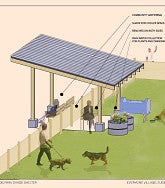
“The support we have received from UO students during these early stages of our organizational development has been instrumental in building a culture of creativity, resilience, and possibility!” said Heather Sielicki, co-lead of Everyone Village.
The student team was awarded a University of Oregon Holden Service Grant ($1,000) that will be used to construct a shade and windbreak shelter for residents. The shelter is tentatively slated for completion in spring 2022.
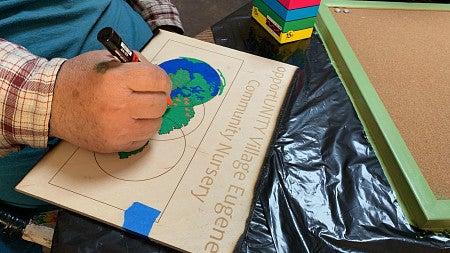
Opportunity Village (OVE) is a transitional micro-housing community for unhoused individuals in Eugene with 30 tiny house units. With climate change contributing to more frequent heatwaves, especially in the PNW, the L4H team co-created a sustainable living forest with hundreds of trees in planters to provide shade and green amenities for the residents. The creation of pilot onsite greywater filtration planters would allow sustainable irrigation for tree growth while minimizing utility costs and the burden on residents.
The City of Eugene Park and Open Space Department partnered with L4H to provide seedlings for the project with plans to buy the grown trees back for local tree-planting initiatives. Under Ko’s guidance, Gonzalez took the lead with the tree nursery in spring 2021 as a part of her master’s project. Thanks to the hard work of everyone involved, OVE is growing over 150 trees onsite, including Giant Sequoias, Sugar Pines, Noble Fir, and Coastal Redwoods.

In addition to these local projects, Junhak Lee, Landscape Architecture faculty, and his students are building pilot agrivoltaics for Everyone Village's garden, a blending of agriculture and photovoltaic technology to create greenhouse units that can produce food and energy all year round. These units will be able to perform year-round thanks to a blending of vertical farming practices and a solar-powered irrigation system.
The pilot greywater planters inspired Audrey Rycewicz, MLA '23, and additional students to build a second generation of greywater planters aimed for public use. On the advice of Russel, the class has plans for the next unit to go to a community-supported shelter that would greatly benefit from onsite greywater treatment.
These types of transdisciplinary solutions showcase the different ways that landscape architecture can be applied to help address the housing crisis and inequities that marginalized communities face.
The focus on collaborative design, social and environmental justice, and commitment to project-based education makes the College of Design’s Landscape Architecture program stand out while reinforcing the college’s history of developing innovative design methods.
“When I was searching out PhD programs, I wanted something that was working with climate justice, social justice, climate resiliency, and renewable energy,” said Loquist. “And that's what led me to Professor Ko—her work with Landscape for Humanity.”
The work and the growth experienced by the students fills Ko with hope for the future.
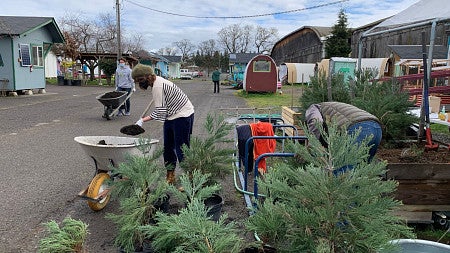
“It has been so inspiring to see the students’ empathy building throughout their time with the community, their excitement for taking real actions, and their personal growth by directly working with communities and taking a lead on innovative projects,” said Ko. “We deeply thank the villagers, community partners, and our funders at UO Foundation and UO Resilience Initiative that supported our transformative actions.”
With each L4H project completed and each new student cohort graduated, the College of Design’s students and faculty take another step toward creating a just and livable future for all.


